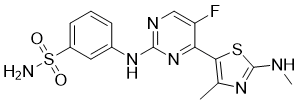CDKI-73 is a novel and potent CDK9 inhibitor with Ki of 4 nM. In comparison to normal B cells and normal CD34+ cells (LD50>20 uM), it demonstrates selective toxicity to CLL cells (LD50=80 nM). Apoptosis is induced and the effects of cisplatin are amplified by CDK9 inhibition.
Physicochemical Properties
| Molecular Formula | C15H15FN6O2S2 |
| Molecular Weight | 394.44 |
| Exact Mass | 394.068 |
| Elemental Analysis | C, 45.68; H, 3.83; F, 4.82; N, 21.31; O, 8.11; S, 16.26 |
| CAS # | 1421693-22-2 |
| Related CAS # | 1421693-22-2 |
| PubChem CID | 71561915 |
| Appearance | Light yellow to yellow solid powder |
| LogP | 4.407 |
| Hydrogen Bond Donor Count | 3 |
| Hydrogen Bond Acceptor Count | 10 |
| Rotatable Bond Count | 5 |
| Heavy Atom Count | 26 |
| Complexity | 577 |
| Defined Atom Stereocenter Count | 0 |
| SMILES | S(C1=C([H])C([H])=C([H])C(=C1[H])N([H])C1=NC([H])=C(C(C2=C(C([H])([H])[H])N=C(N([H])C([H])([H])[H])S2)=N1)F)(N([H])[H])(=O)=O |
| InChi Key | GAIOPWBQKZMUNO-UHFFFAOYSA-N |
| InChi Code | InChI=1S/C15H15FN6O2S2/c1-8-13(25-15(18-2)20-8)12-11(16)7-19-14(22-12)21-9-4-3-5-10(6-9)26(17,23)24/h3-7H,1-2H3,(H,18,20)(H2,17,23,24)(H,19,21,22) |
| Chemical Name | 3-[[5-fluoro-4-[4-methyl-2-(methylamino)-1,3-thiazol-5-yl]pyrimidin-2-yl]amino]benzenesulfonamide |
| Synonyms | CDKI73; CDKI-73; CDKI 73; asnuciclib [INN]; asnuciclib |
| HS Tariff Code | 2934.99.9001 |
| Storage |
Powder-20°C 3 years 4°C 2 years In solvent -80°C 6 months -20°C 1 month Note: Please store this product in a sealed and protected environment (e.g. under nitrogen), avoid exposure to moisture. |
| Shipping Condition | Room temperature (This product is stable at ambient temperature for a few days during ordinary shipping and time spent in Customs) |
Biological Activity
| Targets | CDK2 (IC50 = 3.27 nM); CDK9 (IC50 = 5.78 nM); CDK1 (IC50 = 8.17 nM); CDK4 (IC50 = 8.18 nM); CDK6 (IC50 = 37.68 nM); CDK7 (IC50 = 134.26 nM); CDK1 (Ki = 4 nM); CDK2 (Ki = 3 nM); CDK9 (Ki = 4 nM); CDK7 (Ki = 91 nM) |
| ln Vitro | CDKI-73 primarily targets CDK9 and downregulates the expression of anti-apoptotic proteins Bcl-2, Mcl-1, and XIAP, causing cancer cells to undergo apoptosis. The bone marrow cells of healthy donors, however, are comparatively less toxic to it.[2] |
| ln Vivo | CDKI-73 targets CDK9 to downregulate anti-apoptotic proteins. It is highly effective against MLL-AML MV4-11 xenografts and is orally bioavailable in vivo.[2] |
| Cell Assay | MV4-11 (1 × 105/well) cells are seeded and incubated for an entire night at 37ºC with 5% CO2. Cells are gathered and centrifuged (300 g, 5 min) following a 24- or 48-hour incubation period with the indicated concentrations of CDKI-73. The pellets are resuspended in cold 70% ethanol for the cell cycle assay, fixed on ice for 15 minutes, and then centrifuged (300 g, 5 min). Following a 1-hour incubation period at 37ºC with 200 μL staining solution, the collected pellets are examined using a Gallios flow cytometer. Cells are taken and processed in accordance with the directions provided in the commercial annexin V-FITC/PI kit to measure apoptosis. |
| Animal Protocol |
female nude (nu/nu) Balb/C mice aged 6–8 weeks 25 mg/kg Oral gavage |
| References |
[1]. Acta Pharmacol Sin . 2016 Nov;37(11):1481-1489. [2]. Invest New Drugs . 2019 Aug;37(4):625-635. |
Solubility Data
| Solubility (In Vitro) |
DMSO: ~79 mg/mL (~200.3 mM) Ethanol: ~1.5 mg/mL (~3.8 mM) |
| Solubility (In Vivo) |
Solubility in Formulation 1: ≥ 2.67 mg/mL (6.77 mM) (saturation unknown) in 10% DMSO + 40% PEG300 +5% Tween-80 + 45% Saline (add these co-solvents sequentially from left to right, and one by one), clear solution. For example, if 1 mL of working solution is to be prepared, you can add 100 μL of 26.7 mg/mL clear DMSO stock solution to 400 μL PEG300 and mix evenly; then add 50 μL Tween-80 + to the above solution and mix evenly; then add 450 μL normal saline to adjust the volume to 1 mL. Preparation of saline: Dissolve 0.9 g of sodium chloride in 100 mL ddH₂ O to obtain a clear solution. (Please use freshly prepared in vivo formulations for optimal results.) |
| Preparing Stock Solutions | 1 mg | 5 mg | 10 mg | |
| 1 mM | 2.5352 mL | 12.6762 mL | 25.3524 mL | |
| 5 mM | 0.5070 mL | 2.5352 mL | 5.0705 mL | |
| 10 mM | 0.2535 mL | 1.2676 mL | 2.5352 mL |
